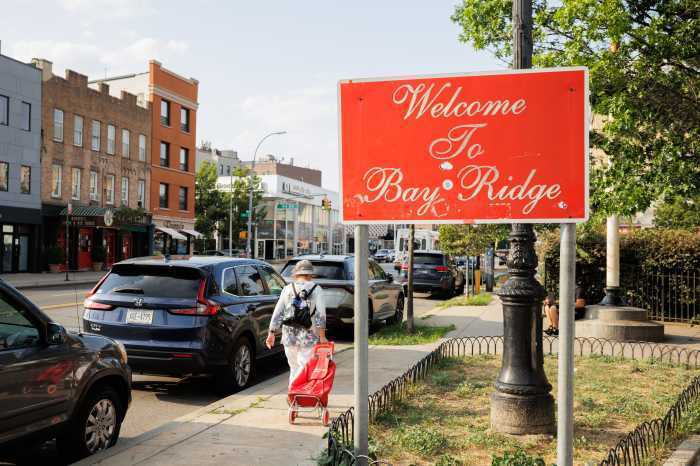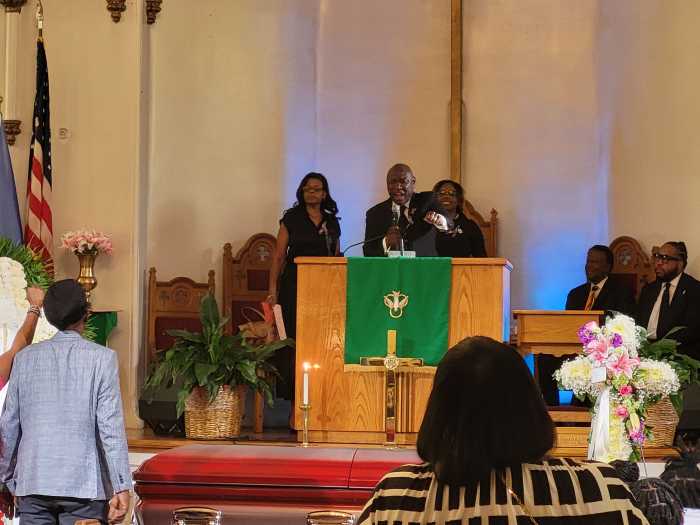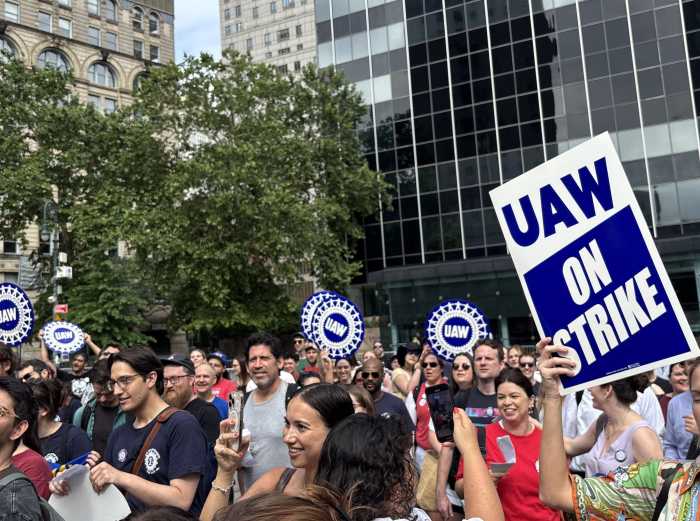Turned back at appeals court, Democrats press forward on contractor law
In the wake of an appellate court ruling that the City Council had exceeded its authority in enacting the Equal Benefits Law to guarantee that city contractors treat their gay and lesbian employees on par with married workers in terms of benefits, leading Democrats on the Council vowed to bring the matter to the state’s highest court, the Court of Appeals.
“It is extremely disappointing that Mayor Bloomberg’s lawsuit against the Equal Benefits Law has resulted in a ruling which sends the message that LGBT New Yorkers and New Yorkers with domestic partners are second class citizens,” said City Councilwoman Christine Quinn, a Manhattan lesbian who sponsored the original bill, in a written statement. “Leave no question about it—in our quest for civil rights, we will appeal this ruling and fight this lawsuit to the very end.”
Though Quinn was traveling out of the city when the ruling was announced on Tuesday, she immediately enlisted the support of Speaker Gifford Miller, who last year led the Council in its override of Mayor Michael Bloomberg’s veto of the legislation. When the mayor announced he would delay implementation of the legislation pending a lawsuit he planned to mount against the measure, Miller, who is a candidate for mayor this year, moved preemptively to force the city to comply.
That strategy met with initial success, when Supreme Court Justice Faviola A. Soto ruled on December 1 that the mayor must implement the law. However, Tuesday’s unanimous ruling by a five-judge panel of the New York Appellate Division found that the Council’s measure was in violation of state law governing municipal contracting and federal law—the Employee Retirement Income Security Act, or ERISA—that oversees employee benefit programs.
The Council’s only recourse now is an appeal to the Court of Appeals. If the measure overcomes the appellate court’s state and federal law objections, Bloomberg could yet appeal that ruling to the federal judiciary.
Some of the harshest reaction to the ruling came from the Empire State Pride Agenda (ESPA), the statewide gay rights lobby.
“The fact that the court has put out a three-and-a-half page decision saying the New York City Council does not have the right to legislate in this area shows it was not even serious about reviewing the legislation and providing a thoroughly-reasoned response,” said Alan Van Capelle, ESPA’s executive director, in a written statement. “The federal issues raised in this decision have already been settled in regards to identical legislation in the state of California, where the law was upheld. If the court’s thinking was accurate, no state and certainly not the city could ever question a vendor’s decision to discriminate. Under this rationale, the city would be forced to contract with the Ku Klux Klan if they were the lowest bidder on a contract.”
Ross Levi, ESPA’s legislative counsel, said Van Capelle’s comment about the Klan was not intended to be sensationalistic.
“To say broadly that no state or locality can ever have something to say about employee compensation is just wrong,” he insisted.
Levi also noted that New York’s reference to a federal ruling on the application of ERISA to a nearly identical law in San Francisco, passed half a dozen years ago and upheld by courts in most respects, was overly broad. He suggested that the appellate court could not do justice to the complex state and federal law questions in a ruling that ran to only three and a half pages.
Alfonso David, a staff attorney at Lambda Legal, echoed much of what Levi said.
He argued that the court’s assertion that the law was invalid because it “excludes a class of potential bidders for a reason unrelated to the quality or price of the goods or services they offer” was dubious.
“We’ve done that before,” David said, pointing to the city’s Living Wage Law that mandates a minimum wage for employees of city contractors and to legislation the city passed several decades ago regarding city contractors doing business with the former apartheid regime in South Africa.
David also said that the restrictions imposed by ERISA requirements on the Council’s ability to legislate in this area, as determined by court challenges to the San Francisco ordinance, “are not as restrictive as drafted in the Appellate Division opinion.”
David agreed too with Levi that he would have expected a more detailed consideration of the underlying issues by the appeals court.
The views of the legal advocates and Quinn were echoed by other councilmembers.
City Councilwoman Eva Moskowitz, who chairs the education committee, held a press conference to press the Bloomberg administration on what she viewed as its lagging or non-existent efforts to implement the Dignity For All Schools Act, an anti-harassment measure that specifically protects queer youth, but she took time to fault the mayor on his challenge to the contractor law as well.
Later, Abby Wilson, a spokeswoman for Moskowitz, descriged her boss as “furious” about the Equal Benefits Law decision.
“This seems to be a very litigation-happy administration when it comes to gay rights,” Wilson said.
gaycitynews.com


































